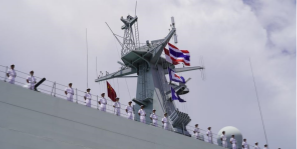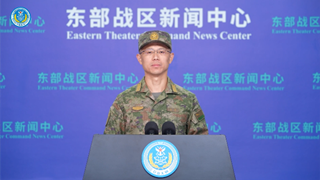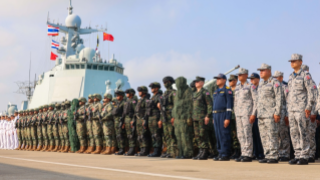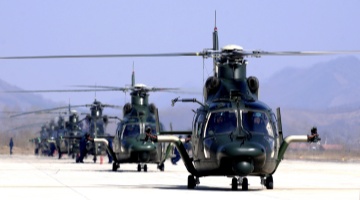Zhang Jie
今年7月,第56届东盟外长会议及系列会议在印尼首都雅加达举行,东盟十国以及中国、美国、俄罗斯、日本、印度等20多个国家的外长共同与会。会议期间,美国国务卿布林肯再次发难中国,煽动各国反对中国,而地区国家对此应声寥寥。这一场景再次展现了美国不遗余力遏制中国,与地区国家拒绝“选边站”的之间的鲜明反差。正如印尼总统佐科在发言中所指出的,东南亚不是大国的竞技场,东盟也不是其他国家的代理人。
The foreign ministers of more than 20 countries, including the ten ASEAN members, China, the US, Russia, Japan and India, attended the 56th ASEAN Foreign Ministers' Meeting and Post Ministerial Conference (AMM-PMC) in Jakarta, Indonesia in July this year. During the meetings, US Secretary of State Blinken's attempt to challenge China and instigate a group opposition against it was met with little response, which revealed a sharp contrast between America's all-out efforts to contain China and the regional countries’ refusal to take sides. As Indonesian President Joko said in his speech, Southeast Asia is not an arena for major countries, nor is ASEAN a proxy for any other country.
事实上,美国“印太战略”的根本目的是遏制中国、维护自身在亚太地区的主导权,这一特性使其出台至今始终遭到地区国家的质疑、警惕与批评。
这是因为美国强化同盟体系、打造对抗性阵营的做法与协商一致、开放包容的“亚洲方式”背道而驰;美国推动地区国家对华“脱钩断链”与亚太国家强调互联互通、优先区域合作的发展观背道而驰;美国炒作安全热点、鼓吹战争风险与加强治理非传统安全的亚太地区需求背道而驰。
Its nature and fundamental purpose to contain China and maintain America’s dominance in the Asia Pacific has exposed the “Indo-Pacific strategy” to constant doubts, vigilance and criticism from countries in the region ever since it was put forward. This demonstrated that America’s practice of strengthening alliances and forming confrontational blocs goes counter to the “Asian approach” characterized by consultation, openness, and inclusiveness; America’s attempt to delink the regional countries from China goes counter to the development philosophy of improving interconnectivity and prioritizing regional cooperation upheld by countries in Asia Pacific; and America’s hype of security threats and war risks goes counter to the region’s demand for enhanced governance of non-traditional security issues.
在外交实践中,区别于日本、澳大利亚等美国盟友对美“印太战略”的支持与追随,东南亚等地区国家则保持战略审慎,针对美国在“印太战略”框架下炮制地缘政治新概念、把持所谓规则制定权、激活与建立地区新机制以及炒作与介入地区安全热点的种种做法,这些国家坚持自主的立场选择,并实施了独立的战略举措。
Unlike Japan, Australia and other US allies that support and follow the Indo-Pacific strategy, Southeast Asian countries have maintained strategic prudence, held their position and adopted independent strategic measures in response to the series of moves that Washington has taken under the framework of that strategy – creating new geopolitical concepts, controlling the so-called rules-making power, activating and forming new regional mechanisms, and hyping up and sticking its nose into regional security issues.
美国把控规则制定权
US control of rules-making power
“印太”概念并非美国首先提出和使用的,但是美国以“印太”替代“亚太”,扩大了美国主导下的“网络化”安全架构范围。对此,东盟对这一概念进行了有选择地使用,既希望通过“印太”概念突出自身在太平洋-印度洋广大地域内的中心位置,同时也清楚认识到美国的战略意图,因而明确重申东盟版“印太”概念更具包容性,并非对美国“印太”概念的全盘接受。
The US used the “Indo-Pacific”concept to replace “Asia Pacific” to expand the networked security architecture under its lead. However, ASEAN used this concept in a selective way. On the one hand, it hopes to highlight its central position in the vast region involving the Pacific Ocean and the Indian Ocean; on the other hand, being fully aware of America’s strategic intention, it has reiterated that the ASEAN version of “Indo-Pacific” is a more inclusive concept rather than the indiscriminate acceptance of what America feeds them.
战略的构建有赖于一系列规则、规范的制定与践行,维护“基于规则的地区秩序”是美国惯用的做法。所谓的“规则维护”实质是通过确立美国版的规则,将自身标榜为“规则维护者”,而将中国诬蔑为“规则破坏者”。
Establishing a strategy requires the formulation and implementation of a series of rules and norms. In this regard, preserving the “rules-based regional order” has been an old trick played by the US, which in essence is just the US making the rules, claiming itself to be the protector of those rules, and then slandering China as the one breaking them.
对此,多数东盟当事国与中国一样,强调根据包括《联合国海洋法公约》在内的国际法处理南海问题,而非完全以南海仲裁案“裁决”作为根本性法律依据。在历次东盟的集体声明中,东盟坚守在南海问题上不提及南海仲裁案“裁决”的底线。更为重要的是,东盟国家与中国达成共识,重视落实《南海各方行为宣言》与推进“南海行为准则”磋商。2022年是《宣言》签署20周年,中国与东盟国家发表共同声明,肯定宣言对维护南海局势稳定的重要意义。在此次东盟外长会议及系列会议举行期间,中国与东盟国家完成了“准则”单一磋商文本的二读,反映了各方在磋商进程上取得进展的政治意愿。
Most ASEAN countries share China’s position to handle the South China issue in accordance with international law, including the United Nations Convention on the Law of the Sea (UNCLOS), rather than take the so-called South China Sea arbitration award as the fundamental legal basis. In fact, all the collective ASEAN statements have upheld the principle of not mentioning the arbitration award when it comes to the South China Sea issue.
More importantly, ASEAN and China have reached a consensus to implement the Declarationon the Conduct of Parties in the South China Sea (DOC) and push forward the negotiation on the Code of Conduct (COC) in the South China Sea. In 2022, the 20th anniversary of the signing of DOC, the two sides issued a joint statement that affirmed the document’s great significance in keeping the regional situation stable. At the latest AMM-PMC, China and ASEAN countries completed the second reading of the Single Draft Negotiating Text (SDNT) of the COC, which fully demonstrated their common political wish to make progress on the COC negotiation.
提升战略自主应对美国冲击
A more strategically independent ASEAN in the face of US interference
加强地区机制建设是美国实施“印太战略”的重要“抓手”,包括加强双边军事同盟关系,激活美日印澳“四方安全对话”,新建美英澳三边安全伙伴关系等等,这很大程度上冲击了地区安全架构,削弱了东盟的“统一性”与地位。
Establishing regional mechanisms, including strengthening bilateral military alliances, activating the US-Japan-India-Australia Quad security dialogue, and forming the US-UK-Australia trilateral security partnership, is an important way for the US to implement its “Indo-Pacific strategy”. These maneuvers have largely shaken the regional security architecture and undermined ASEAN’s “unity” and position.
对此,尽管拜登政府上台后反复强调“四方安全对话”及美英澳三边安全伙伴关系与东盟在地区架构中具有“互补性”,多数东南亚国家仍质疑美国支持东盟地位的可信度。印尼、马来西亚等国政要公开批评美英澳三边安全伙伴关系引发地区核扩散潜在威胁。2022年起,东盟努力重塑战略自主,重点推动“东盟印太展望”的落实,以期基于此引导地区合作议程和推动国际社会的包容与开放。
Although the Biden administration has repeatedly stressed how the Quad and AUKUS are “complementary” with ASEAN in the regional landscape, most Southeast Asian countries are cynical about America’s commitment to supporting ASEAN’s central position. Leaders of Indonesia and Malaysia have publicly condemned the AUKUS for creating the potential risk of regional nuclear proliferation.
Since 2022, ASEAN, striving to reshape its strategic independence, has made special efforts to push the implementation of the ASEAN Outlook on Indo-Pacific (AOIP) in a bid to set the agenda for regional cooperation and enable a more inclusive and open international community.
同时,东盟强调将《联合国宪章》《东南亚友好合作条约》等作为打造各方共同遵守的地区规范的重要性,并在本年度东盟外长会议联合公报中重申了不结盟原则,与美国倾力打造同盟体系形成了鲜明对比。
In the meantime, ASEAN underscores the importance of taking the UN Charter and the Treaty of Amity and Cooperation in Southeast Asia (TAC) as the regional norms that should be observed by all parties. It also reiterated its commitment to the principlesof non-alignment in the “JOINT COMMUNIQUÉ OF THE 56th ASEAN FOREIGN MINISTERS’ MEETING”, posing a sharp contrast to America’s alliance system.
保持战略清醒,反对地缘政治博弈
Maintaining strategic sobriety against geopolitical game
美国不断完善其“印太战略”的具体议程,试图形成对中国的全方位围堵。一方面,美国持续炒作与介入地区安全热点,增加地区国家的战略焦虑;另一方面,美国试图将经济、科技议题“安全化”,出台排除中国在外的“印太经济框架”,构建针对中国的规则壁垒等。
The US has kept fleshing up its “Indo-Pacific strategy” with a view to realizing all-round containment of China. For one thing, it keeps hyping up and meddling in regional security issues to augment regional countries’ strategic anxiety. For another, it tries to link economic and technological subjects with “security”, not only throwing out the “Indo-Pacific economic framework” excluding China, but also setting rules deliberately meant to keep it out.
面对美国裹挟与误导本地区的合作议程,地区国家保持了高度的战略清醒。2022年8月台海危机出现新一轮升级后,东盟第一时间集体发声,明确表示坚持一个中国的立场。同时,印尼、马来西亚、斐济等东南亚、南太平洋国家利用香格里拉安全对话、东盟地区论坛等地区平台纷纷表态,较之于所谓的大国博弈,海平面上升、粮食短缺、能源短缺、跨国犯罪、公共卫生安全等才是关乎地区国家社会稳定、经济发展甚至生死存亡的现实威胁。
Regional countries have retained a high level of strategic sobriety regarding America’s intentions to mislead and derail their cooperation agenda. When a new round of crisis occurred in the Taiwan strait in August 2022, ASEAN issued a joint statement at the first opportunity announcing their position to bolster the one-China principle, while Southeast Asian and South Pacific countries such as Indonesia, Malaysia and Fiji also declared their positions at the Shangri-La Dialogue, ASEAN Regional Forum and other regional platforms. In comparison with the so-called major-country competition, the rising sea level, food shortage, energy shortage, cross-border crimes, and public health and security are real threats concerning the social stability, economic development, and even the very survival of countries in the region.
对于美国鼓吹“脱钩论”“去风险论”,大多数地区国家的态度是担心美国此举会破坏地区既有经济合作,导致全球科技进步被阻碍。地区国家希望建立一个多极、开放的大环境。这些都反映出当前广大发展中国家提升战略自主的意愿,势必将对包括亚太地区在内的全球秩序产生深刻影响。
Most of these countries are worried that the “delinking” and “de-risking” theories peddled by the US will sabotage the existing economic collaboration and hinder global sci-tech progress. What they want to see is a multi-polar, open international environment. All these reflect the developing countries’ strong wish to enhance their strategic independence, which is bound to exert profound effects on the global order, including the Asian Pacific region.
(作者张洁,中国社会科学院习近平新时代中国特色社会主义思想研究中心特约研究员。)
(Zhang Jie, invited researcher at the Center for Xi Jinping Thought on Socialism with Chinese Characteristics for a New Era, CASS)
Editor's note: Originally published on gmw.cn, this article is translated from Chinese into English and edited by the China Military Online. The information and opinions in this article do not necessarily reflect the views of eng.chinamil.com.cn.









